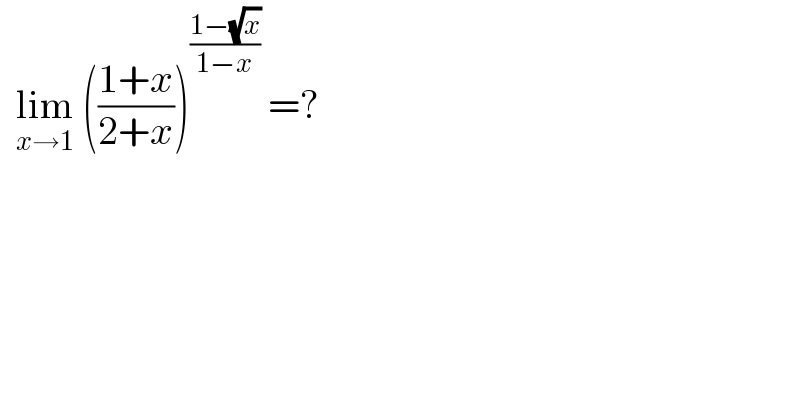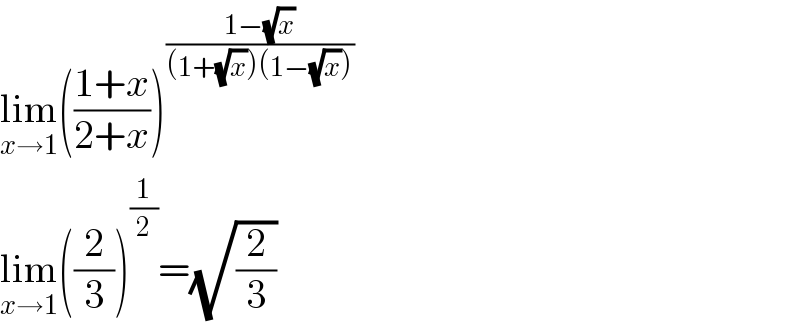
Question and Answers Forum
Question Number 122721 by bemath last updated on 19/Nov/20

Answered by Dwaipayan Shikari last updated on 19/Nov/20

Answered by liberty last updated on 19/Nov/20
![Solve lim_(x→1) (((1+x)/(2+x)))^((1−(√x))/(1−x)) ? Solution : denote h(x)=((1+x)/(2+x)) ; r(x)=((1−(√x))/(1−x)) { ((lim_(x→1) h(x)= (2/3))),((lim_(x→1) r(x)=lim_(x→1) ((1−(√x))/((1+(√x))(1−(√x))))=(1/2))) :} but at finite limits lim_(x→a) h(x) = A>0 , lim_(x→a) r(x)= B the following relation holds true : lim_(x→a) (h(x))^(r(x)) = e^(lim_(x→a) r(x).ln h(x)) = e^(B.ln A) = A^B . Hence lim_(x→1) (((1+x)/(2+x)))^((1−(√x))/(1−x)) = ((2/3))^(1/2) =(√(2/3)) Note: If in handling examples of the form lim_(x→1) (h(x))^(r(x)) it turns out that lim_(x→a) h(x)=1 and lim_(x→a) r(x)=∞ , then the following transformation may be recomended : lim_(x→a) [ h(x)]^(r(x)) = lim_(x→a) {1+[ h(x)−1] }^(r(x)) = lim_(x→a) {[1+(h(x)−1)]^(1/(h(x)−1)) }^(r(x)[h(x)−1 ]) = e^(lim_(x→a) r(x) [h(x)−1 ] ) . ▲](Q122723.png)
Commented by liberty last updated on 19/Nov/20
![for example find the limit : lim_(x→∞) (((2x^2 +8)/(2x^2 −5)))^(6x^2 +5) ? Solution : let us denote : h(x)=((2x^2 +8)/(2x^2 −5)) ; r(x)=6x^2 +5 lim_(x→∞) h(x)= lim_(x→∞) ((2x^2 +8)/(2x^2 −5)) = 1 lim_(x→∞) r(x)= lim_(x→∞) (6x^2 +5)=∞ use the formula lim_(x→∞) (((2x^2 +8)/(2x^2 −5)))^(6x^2 +5) = e^(lim_(x→∞) r(x) [h(x)−1 ]) ; [ h(x)−1=((13)/(2x^2 −5)) ] = e^(lim_(x→∞) (((13(6x^2 +5))/(2x^2 −5)))) = e^(39) . ✓▲](Q122724.png)
Commented by bemath last updated on 19/Nov/20

